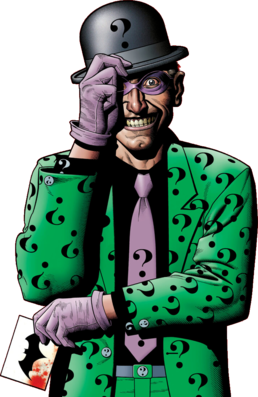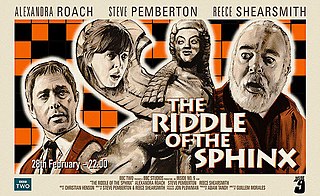Related Research Articles

Elephants are the largest living land animals. Three living species are currently recognised: the African bush elephant, the African forest elephant, and the Asian elephant. They are the only surviving members of the family Elephantidae and the order Proboscidea; extinct relatives include mammoths and mastodons. Distinctive features of elephants include a long proboscis called a trunk, tusks, large ear flaps, pillar-like legs, and tough but sensitive grey skin. The trunk is prehensile, bringing food and water to the mouth and grasping objects. Tusks, which are derived from the incisor teeth, serve both as weapons and as tools for moving objects and digging. The large ear flaps assist in maintaining a constant body temperature as well as in communication. African elephants have larger ears and concave backs, whereas Asian elephants have smaller ears and convex or level backs.

A lightbulb joke is a joke cycle that asks how many people of a certain group are needed to change, replace, or screw in a light bulb. Generally, the punch line answer highlights a stereotype of the target group. There are numerous versions of the lightbulb joke satirizing a wide range of cultures, beliefs, and occupations.

A joke is a display of humour in which words are used within a specific and well-defined narrative structure to make people laugh and is usually not meant to be interpreted literally. It usually takes the form of a story, often with dialogue, and ends in a punch line, whereby the humorous element of the story is revealed; this can be done using a pun or other type of word play, irony or sarcasm, logical incompatibility, hyperbole, or other means. Linguist Robert Hetzron offers the definition:
A joke is a short humorous piece of oral literature in which the funniness culminates in the final sentence, called the punchline… In fact, the main condition is that the tension should reach its highest level at the very end. No continuation relieving the tension should be added. As for its being "oral," it is true that jokes may appear printed, but when further transferred, there is no obligation to reproduce the text verbatim, as in the case of poetry.

The chicken is a large and round short-winged bird, domesticated from the red junglefowl of Southeast Asia around 8,000 years ago. Most chickens are raised for food, providing meat and eggs; others are kept as pets or for cockfighting.

Stockwell is a district located in South London, part of the London Borough of Lambeth, England. It is situated 2.4 miles (3.9 km) south of Charing Cross.

"Why did the chicken cross the road?" is a common riddle joke with the answer being "To get to the other side." It is commonly seen as an example of anti-humor, in that the curious setup of the joke leads the listener to expect a traditional punchline, but they are instead given a simple statement of fact. The joke has become iconic as an exemplary generic joke to which most people know the answer, and has been repeated and changed numerous times over the course of history.

The Riddler is a supervillain appearing in American comic books published by DC Comics. The character was created by Bill Finger and Dick Sprang, and debuted in Detective Comics #140 in October 1948. He has become one of the most enduring enemies of the superhero Batman and belongs to the collective of adversaries that make up his rogues gallery.

The tradition of humor in Judaism dates back to the compilation of the Torah and the Midrash in the ancient Middle East, but the most famous form of Jewish humor consists of the more recent stream of verbal and frequently anecdotal humor of Ashkenazi Jews which took root in the United States during the last one hundred years, it even took root in secular Jewish culture. In its early form, European Jewish humor was developed in the Jewish community of the Holy Roman Empire, with theological satire becoming a traditional way to clandestinely express opposition to Christianization.

Cotton swabs or cotton buds are wads of cotton wrapped around a short rod made of wood, rolled paper, or plastic. They are most commonly used for ear cleaning, although this is not recommended by physicians. Other uses for cotton swabs include first aid, cosmetics application, cleaning, infant care, and crafts. Some countries have banned the plastic-stemmed versions in favor of biodegradable alternatives over concerns about marine pollution.
In the Soviet Union and the former Communist Eastern bloc countries, a popular type of humour emerged in the 1950s and 1960s featuring the fictional broadcaster called the Armenian Radio in the USSR and Radio Yerevan elsewhere. These jokes are typically structured in a question-and-answer session with what would purportedly be the host of the actual Armenian Radio but which would often touch topics that would be sensitive for the Communist authorities or which would otherwise be liable for censorship.
An elephant joke is a joke cycle, almost always an absurd riddle or conundrum and often a sequence of such, that involves an elephant. Elephant jokes were a fad in the 1960s, with many people constructing large numbers of them according to a set formula. Sometimes they involve parodies or puns.

The newspaper riddle is a riddle joke or conundrum in English that begins with the question:
The Cockney Alphabet is a recital of the English alphabet intended to parody the way the alphabet is taught to small working class children. The ostensible humour comes from forming unexpected words and phrases from the names of the various letters of the alphabet, mocking the way people from East London speak. Cockney is a name given to the working class of East London by the middle and upper classes.
Russian political jokes are a part of Russian humour and can be grouped into the major time periods: Imperial Russia, Soviet Union and post-Soviet Russia. In the Soviet period political jokes were a form of social protest, mocking and criticising leaders, the system and its ideology, myths and rites. Quite a few political themes can be found among other standard categories of Russian joke, most notably Rabinovich jokes and Radio Yerevan.

"Smack in the Middle" is a first-season episode of Batman. It first aired on ABC TV Thursday January 13, 1966. It is the conclusion of the two-part series pilot, the first being titled "Hi Diddle Riddle", which aired on the previous Wednesday night January 12.
Dead baby jokes are a joke cycle reflecting dark comedy. The joke is presented in riddle form, beginning with a what question and concluded with a grotesque punch line answer.
Anti-humor or anti-comedy is a type of alternative humor that is based on the surprise factor of absence of an expected joke or of a punch line in a narration that is set up as a joke. This kind of anticlimax is similar to that of the shaggy dog story. In fact, some researchers see the "shaggy dog story" as a type of anti-joke. Anti-humor is described as a form of irony or reversal of expectations that may provoke an emotion opposite to humor, such as fear, pain, embarrassment, disgust, awkwardness, or discomfort.
South and West Asia consists of a wide region extending from the present-day country of Turkey in the west to Bangladesh and India in the east.
Lawyer jokes, which pre-date Shakespeare's era, are commonly told by those outside the profession as an expression of contempt, scorn and derision. They serve as a form of social commentary or satire reflecting the cultural perception of lawyers.

"The Riddle of the Sphinx" is the third episode of the third series of the British dark comedy anthology television programme Inside No. 9. It first aired, on BBC Two, on 28 February 2017. The episode was written by the programme's creators, Steve Pemberton and Reece Shearsmith, and directed by Guillem Morales. "The Riddle of the Sphinx", which is set in Cambridge, stars Alexandra Roach as Nina, a young woman seeking answers to the Varsity cryptic crossword, Pemberton as Professor Nigel Squires, who pseudonymously sets the crossword using the name Sphinx, and Shearsmith as Dr Jacob Tyler, another Cambridge academic. The story begins with Nina surreptitiously entering Squires's rooms on a stormy night and being discovered; this leads to Squires teaching her how to decipher clues in cryptic crosswords.
References
- 1 2 3 Mac E. Barrick, "Racial Riddles & the Pollack Joke", Keystone Folklore Quarterly, Volume 15, Issue 1, 1970, pp. 3–15
- ↑ Nigel F. Barley (1974), "Structural Aspects of the Anglo-Saxon Riddle", Semiotica 10 (2)
- ↑ Salcia Landmann, Der Jüdische Witz, Soziologie und Sammlung ("The Jewish Humor, Its Sociology and a Collection", citing from the Russian translation: Еврейское остроумие, 2002, ISBN 978-5-9953-0202-5, p. 17.